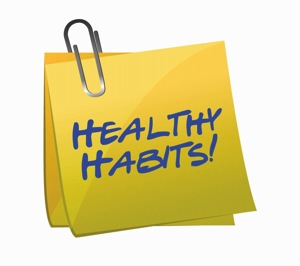
So you've either just gotten the results back from your food sensitivity test or your practitioner says you need to follow the autoimmune diet, also called the leaky gut diet, to manage your autoimmunity. The autoimmune diet comes as a shock to many due its strict limitations and compliance can be tough. The trick to sticking to the autoimmune diet is understanding how to work with your mind to establish new habits.
Although a goal is important — say someone wants to manage her Hashimoto's hypothyroidism, an autoimmune disease that affects the thyroid gland — research shows a goal alone is not enough to change your habits. We've all made promises to reform only to quickly succumb to the spell of temptation. Research shows we are more motivated by the daily habits toward that goal than the goal itself. The key is not in the big sweeping gesture fueled by fantasy, but instead the small, tangible things we do each day to move us toward our goal.
How to create new habits to stick to the autoimmune diet
It takes 66 days to create a new habit, so commit to a plan of supporting yourself and your new way of life.
Create a vision board of your healthier life. Create a vision board, a collage of images that represent what life will look at when you reach your goal of more successfully managing your autoimmune disease. For instance, your vision board can feature images of feeling energetic, having fun with your kids, doing a sport or activity you love, a place you've always wanted to visit, romance, and other images that capture the life you will lead when freed from your symptoms. Put it where you see it every day so that the images seep into your subconscious mind.
Schedule time for your diet. Schedule time each week to chop veggies, cook meats, put together crockpot meals, and make snacks. You're most likely to cave when hungry, so create the convenience and accessibility ahead of time to ensure your success.
Check in with your habit building and stress levels. Big life changes are an eternal work in progress not a destination. You will bring down your health if you make the diet stressful. So check in with yourself regularly to see how it's working for you and whether it's stressing you out, and tweak and modify as needed.
Get support from others. Social support is not only healthy in itself, but it's also vital to your success. Join online groups of others on a similar path, enlist friends or family to encourage you, and don't engage those who try to ridicule or sabotage you.
Change your subconscious beliefs. Our subconscious mind plays a significant role in our daily habits, good or bad. You may have unidentified belief systems that are working against your success. There are many methods and books available these days to help you, including EFT, EMDR, hypnotherapy prayer, and books such as those by Joe Dispenza.
Practice positivity. Yes, the autoimmune diet can be challenging. But having a sour attitude will only set you up for failure. Studies show subjects who spend a little time regularly practicing positivity and gratitude have far better outcomes than those who don't. It's no different than learning a new skill — investing just a few minutes a day thinking about something that makes you feel good or about things for which you are grateful pays you back amply.



Latest from the Blog
Breaking Through Cancer Barriers: News Outlets Spotlight High-Dose Vitamin C Therapy
December 5, 2024https://www.yahoo.com/news/pancreatic-cancer-patient-survival-doubled-152722177.html Harnessing the Power of High-Dose Vitamin C in Cancer Treatment Recent advances in cancer treatment research have brought renewed attention to high-dose intravenous (IV) vitamin C, particularly in extending survival rates for patients with advanced different forms of cancer. A groundbreaking phase 2 clinical trial Study Finds demonstrated that combining high-dose IV vitamin C […] Read more
Latest from the Blog
The Dirty Dozen
The “Dirty Dozen” is a list of fruits and vegetables, compiled by the Environmental Working Group (EWG), that you should always eat organically. These produce items are not only delicious and nutrient-rich but also tend to carry high levels of pesticide residues when grown conventionally. By opting for organic versions, you can significantly reduce your […] Read more